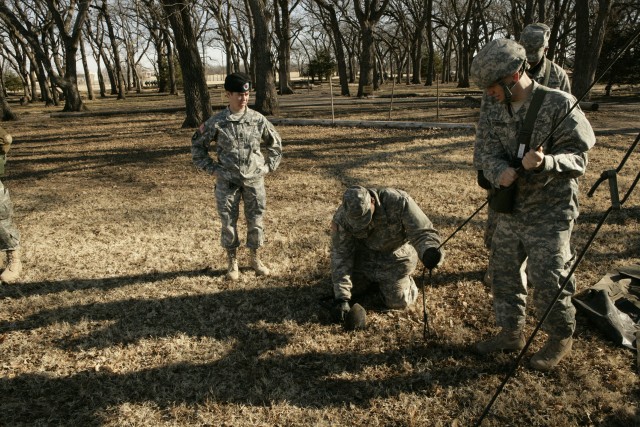Little Jenny Clement didn't mean to make history when she joined the Army. In fact, the 17-year-old runaway said she was really trying to provoke her parents, her father in particular.
"He was an E-7 in Viet Nam, and when I ran away he thought I was only joining the Army to get away from him and find a husband," Clement said. "That was his mindset, typical of the times."
Times have changed in a major way for Clement and the Army. After 25 years of Army life, the feisty Boston native was promoted to the rank of command sergeant major in January: She became the first female ever to hold that rank in the Field Artillery, one of the Army's all-male combat arms.
Clement broke the all-male glass ceiling by overcoming a load of obstacles.
First, she had to overcome her own upbringing. She said she ran away at 17 because her mother made some phone calls to arrange for her to attend the right college. Clement wanted to make it on her own.
"I was a brat when I joined the Army," Clement said with a shake of her head. "I came from Boston, the Snob Hill crowd, and really had an attitude." Clement said her first assignment to the infantry division at Fort Ord, Cali., changed her attitude as she adjusted to the Army.
Challenges weren't limited to her sex, either. Clement also had to overcome the prejudice that she wasn't a "real" artilleryman. Clement spent most of her career as a field artillery meteorologist. She went out with division-level artillery units to report and predict local weather to help units achieve, "first hit accuracy." Though the "metro" section (so called because it was hard to pronounce "meteorological") went out to the field with the headquarters, supported the guns like the rest of the brigade's support element, felt the cold and rain and snow with the rest of the Army, they didn't pull lanyards, haul lanyards or other "real" artillery jobs. To some men, because the metro section members weren't combat arms, they were barely a part of the field artillery.
Airborne artillery
It's an opinion that Clement understands. Understanding came to her when she made the move from metro section to an operations tent. She was assigned to the 101st Airborne Fire and Effects Coordination Cell. That cell provides artillery support for the entire division.
"To be assigned in charge of the FECC section was the biggest honor in the artillery," Clement said. On the other hand, Clement admits she wasn't trained for the job. She didn't know anything about fire direction. She couldn't read operations overlays on maps. She couldn't write an operations order.
"It was all foreign to me," Clement said. "... As a female meteorologist, I wasn't allowed to hang around the FSE. They were all 13Foxes [artillerymen]."
Fortunately, help was close.
"I had an incredible colonel who took me under his wings," Clement said. "... I learned so much ... If you don't have a working knowledge of a TOC when you become a senior NCO, it will break you. It will overwhelm you."
She picked up the operations tools needed to succeed in a tough assignment only to confront another barrier: selection for the Sergeants Major Academy.
"I wanted a first sergeant position, but I just wasn't competitive with people who had already attended the SMA. I really didn't see me getting a slot. There was just a finite number of seats available and, let's be honest, there were many more qualified artillery men to compete for those seats than this one artillery woman," Clement said.
Unexpectedly, she caught a break, was pulled out of an Iraq deployment, and was sent to school at SMA.
Peace keeping
Another of Clement's firsts came when her unit was deployed to Bosnia. She became the first artilleryman in Bosnia in 1995.
"What happened is my plane landed before the operations staff," Clement said. "The TOC didn't even come in until two days later ...That was a trip. It was crazy."
About 6 percent of the allied peace keepers were air lifted into Tuzla, Bosnia, to secure the airfield and established headquarters. The other 94 percent, the heavy divisions, were to drive into Bosnia over the Sava River. The Army planned to cross the river using a ribbon bridge. Unfortunately, the weather didn't cooperate. The river crossing site became flooded and became a nightmare of mud.
"It was horrible," Clement recalled the flooded site. "We lost tanks. We lost a whole lot of equipment."
Next step
My whole career, the one job I ever wanted was to be the HHB [DIVARTY] first sergeant of the 101st Airborne" Clement said. "All my biggest mentors had been first sergeants of that battery. When I finally made E-8, I thought 'This is it!', but there was another female E-8 and technically she out-ranked me by a year. She got the job."
Instead of her dream job, Clement was made first sergeant of a unit training basic trainees at Fort Sill. Clement said it was a strange choice for the Army to make, since Army policy requires basic training first sergeants have drill sergeant experience and understand the ins and outs of the job.
She served over a year in that position, then Clement said she bounced through a couple of other Fort Sill assignments. Clement confided that she felt like taking retirement several times during this period. She said she was aching for a first sergeant position with a DIVARTY, "Because it was the type of unit I was raised in. I love it."
"I know I won't I leave this battalion and take over a field artillery brigade," Clement said. "I'm realistic. I know the restrictions. But I'd like to have a maneuver unit."


Social Sharing